|
Back to Hall of Fame
Inductees |
|
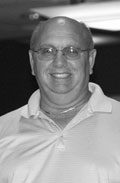 |
Howard Belvoir
(1944- , Inducted 2013)
Born in Iola, Kansas, on May 13, 1944, to R. H. and Evelyn Belvoir, Howard Belvoir was raised in Payette, Idaho. His first experience with racehorses came at age 13 when he went to work as a hotwalker for Roy and Troy Taylor. The Taylors had trained a few runners for his parents, including Run Atom, a 1952 gelding who won over 25 races. Before long, the young horseman graduated to being a groom and spent his summers working at Portland Meadows, Longacres, Exhibition Park and Playfair.
After graduating from high school in 1962, he attended Boise Junior College, but didn’t stay long. By the spring of 1963 Belvoir had taken out his trainer’s license at Exhibition Park, where his first winner came when Fairlyonest, a four-year-old gelding by Recur who was bred by his father and owned by R. H. Belvoir & Sons, won the third race on August 19 by a neck.
His first wife, Mary Taylor, was a sister to the Taylor brothers and they had three sons: Heath, Vann and Clay. Heath is a chart caller for Equibase who works the Fair Grounds and Saratoga circuit. Vann, after a successful career as a jockey (he was leading rider at the 1996 inaugural Emerald Downs meet and still sports the track’s highest rider win percentage with 23.70), is now a successful trainer in Southern California. Clay works for The Boeing Company.
Belvoir’s first really good horse was the Oregon-bred Red Eye Express, who won 22 races over six seasons, including eight sprint stakes – featured by back-to-back-to-back tallies in the Speed Handicap – at Longacres and the Grade 3 Paso Robles Handicap. The son of Philately, who earned $160,354, was one of the most popular runners at Longacres during the early 1970s.
Among his other stakes winners at the Renton oval were: Miss Zulu Gold (1982), Windsong Maria (1989), That Knight (1991), Table Fifteen (1989, 1990), Danae Ru (1979) and Allowance (1984).
During the three-year period (1993-95) Emerald Racing Association ran at Yakima Meadows, Belvoir and his assistant trainer Steve Bullock ranked second in wins with 96, despite only having one starter at the 1995 meet. Among their wins was a victory by Crystal’s Doubles in the Morrie Alhadeff Stakes. Belvoir also won the 1982 Yakima Debutante Stakes with Miss Zulu Gold and the 1983 Yakima Valley Derby with Valley Express.
Belvoir’s name will be ever linked with Wasserman, who he not only trained, but bred and owns. The 2002 gelding by Cahill Road had a highly successful career spanning nine years and 83 starts, winning or placing in 18 stakes, which included a popular victory in the 2008 Longacres Mile (G3) that led to many honors. $575,024 of Wasserman’s $599,091 total earnings and all of his 13 wins came at the Auburn track.
Voted horse of the meet and later Washington horse of the year, champion handicap horse and sprinter, Wasserman’s exploits would lead to Belvoir being given a state special achievement award and being named Washington TOBA winner for 2008. Belvoir was additionally recognized as TOBA small breeder of the year.
Belvoir’s first Mile win was immediately followed by his second in 2009, with Assessment.
Belvoir has trained many other Washington-bred stakes winners through the years, including state champions Mulcahy, Sundance Circle, Commercial Choice, Serenity Road, Seattles Best Joe and Immigration.
His latest stakes winner came on Washington Cup XI when he saddled daughter-in-law Sauci Belvoir’s He’s Not Bluffin to win the Jim Beam Stakes.
Through September 15, 2013, Belvoir runners have made 14,891 starts with 1,911 wins, 2,007 seconds and 1,972 thirds and have earned $17,757,481. His best season so far was in 1994 when horses under his care earned $1,113,536. Of those totals, 4,537 starts, 622 wins, 658 seconds, 628 thirds and $6,391,335 in earnings have come at Emerald.
In 2010 he was honored by Emerald Downs with the Martin Durkan Award. |
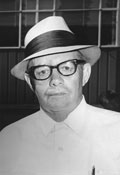 |
Wayne Branch
(1903-1980, Inducted 2012)
Wayne Branch, the highly respected horseman who was the leading conditioner at Longacres for five years, was the first trainer in Longacres history to win three straight training titles (1961-63). His other titles came in 1959 and 1966. His 1961 title was earned with a record 41 wins. Branch won a total of 20 stakes races at Longacres and was the co-ranked 15th leading trainer in that category along with William Findlay. Branch and fellow 2012 Hall of Fame inductee Paul Frey teamed together for many wins.
Branch started training horses at age 12 off his father’s Miles City, Montana, ranch. According to his son Billy Branch, at age 14, his father “became apprenticed to a couple of trainers who would race horses Roman-style. In the early days Dad told me they would tie the horses they raced to the chuckwagon and go from one farming community to another.”
Branch was affectionately known as “The Master,” and according to a story in the July 1974 The Washington Horse, “He was praised for his knowledge of horses and picking the most advantageous spot to run them. But sometimes, he was also regarded as a figure of mystery, touched by folklore founded upon an adventuresome youth and stirred by whispers of secret leg paints and magical powers to restore old cripples.”
He earned a reputation for rehabilitating “banged-up old campaigners,” and once said he preferred dealing with older horses, picking them off in the claiming ranks and trying to improve upon the previous trainers methods. “It’s just a matter of patience,” said the quiet-spoken Branch. “Massage and medication can’t be done in a hurry.”
Among the many good horses Branch developed in Washington were Lak Nak, Flashlite Boy, Te Amo Weep (Washington champion two-year-old and Washington Futurity winner), Ocean Bridge, Hanaford, Boundaway, Daysie Dawn, Flying Gem and Splendored Thing. Branch was also a successful trainer on the Arizona circuit.
Branch claimed Lak Nak, then five, in 1965 in California for $4,500 for Renton dentist Dr. John Delorie and the top sprinting son of My Host won eight stakes at Longacres, including three straight Renton Handicaps (1965-67) and held track records at 5 1/2, six and 6 1/2 furlongs.
Another multiple track record holder nurtured by Branch was Ocean Bridge, who set four track records at Playfair and another at Arizona Downs.
During his long career Branch was among the leading trainers in North America by wins. Branch’s name was first listed in Daily Racing Form records in 1951 (a trainer had to have had a minimum of ten wins to be included) with 16 victories and $9,238 in earnings. In the 27 years his name appeared (he either did not train or have enough winners in 1970-72), he saddled 1,147 winners who earned $2,118,331. While Branch’s high-water mark in earnings came in 1968 ($255,784), from 1960 through 1967 he was rated seven times among the top 30 North American trainers in wins, including ranking third in 1962 with 113 wins. He also had 113 wins in 1963 to rank fifth, but what was remarkable about that year was that he had the highest win percentage (26.5) of all trainers in the top 30 and had a top-three percentage of 53.2.
Branch had retired from training in the late 1960s but returned to the barns in 1972 and counted S. J. Agnew among his clients. Harriet Moore’s Sir Runnin Prince was most likely his final stakes horse after he finished second in the 1978 Juvenile Champion Stakes at Longacres.
Branch died of cancer on April 8, 1980, at age 77. |
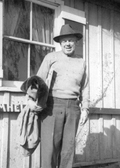 |
Allen Drumheller, Sr.
(1894-1955, Inducted 2003)
A native of Walla Walla, Washington, Allen
Drumheller, Sr. is one of only two trainers to saddle winners of the Longacres
Mile four times – Campus Fusser (1941), Lavengro (1942), Hank H. (1947)
and Amble In (1948). In the 1948 renewal, his runners finished first, second
and third. He also won the Longacres Mile in 1938 as an owner with Triplane. In
1944, Drumheller helped bring Washington racing into the limelight by winning
the Stars and Stripes Handicap at Arlington Park with Washington-bred Georgie
Drum, who defeated Kentucky Derby winner Pensive in that race. Other notable
wins include the 1941 Inglewood Handicap at Hollywood Park with Sir Jeffrey and
the 1955 Washington Derby and Hollywood Oaks with Baby Alice, who was named
Hollywood Park three-year-old of the meeting in 1955. Additionally,
Drumheller’s Sirde became the first Washington-bred winner of over
$100,000 and his charge Campus Fusser won the first Washington Futurity
(Gottstein Futurity) in 1940. Before becoming involved with Thoroughbreds,
Drumheller was a world champion rodeo performer and later served as the first
chairman of the Washington Horse Racing Commission.
Click here for expanded profile. |
RPP.jpg) |
Ben Harris
(1938- , Inducted 2014)
The opening remarks at the August Hall of Fame presentation honoring trainer Ben Harris reminded his fellow horsemen and other numerous attendees that "His constant smile and likeable personality opened doors; and his keen perception with horses and animals made him a natural trainer."
A native of the tiny Eastern Washington community of Satus, Ben Harris was the eighth of nine children who grew up on his parents' dairy farm located in the Yakima Valley.
In 1958, Harris married his schoolmate Mary Jane Beard, who soon became an integral part of his racing team and the mother of Clint Harris, who followed his dad and became a successful horse trainer.
The older Harris got his start at the track through his brother-in-law, horseman Frank Beard. In 1964, he started off driving a tractor at the brand new Yakima Meadows, but soon started training two fillies and a colt given to him by Beard. Harris won the very first stakes run at the Yakima oval, the 1964 Yakima Valley Derby, in which runner Bilmora earned $250 for the win. Harris went on to add three more tallies in the Derby: Holme Run Kid (1984), the filly Table Morn (1988) and Dimmick (1990).
Harris became the Central Washington track's leading trainer by stakes wins (27) and won four training titles at Yakima Meadows (spring 1992; fall 1975-76 and 1989).
On the western side of the state, Harris was the only trainer in Longacres' 59-year history to win four straight training titles (1989-92), including the 1991 meet when his 93 wins from 331 starts shattered the single-season record. Tom Roberts' previous record, set in 1986, was 81. Harris' 31 Longacres stakes wins rank him ninth all-time. In 1980, Harris was honored with the Steve O'Donnell (later renamed the Martin Durkan) Award.
Harris developed five champion Washington-breds: Rosey Leader (1980 two-year-old filly, for the Klimovich family's Valleymeade Farm); Lady Marion (1980 three-year-old filly, for father and son Don and Don Clark); Native Sky (1977 three-year-old male, for Dr. John Furukawa's Riverview Farm); Chalk Box (1989 three-year-old filly, for George Layman Jr.'s Forest Acres) and Parnu (1990 three-year-old male, who also raced for Layman). Both Lady Marion and Chalk Box won the Washington Oaks during their championship seasons.
During the late 1980s and early 1990s, the Harris stable at Longacres grew regularly in numbers with the influx of literally "trainloads" of horses from California, homebreds and sale purchases, all for Layman. The two Central Washington horsemen's first stakes winner together was Pencil Box, a four-year younger sister to Chalk Box who won the 1984 Green River Valley Stakes at Longacres. Harris also won the 1983 Green River Valley Stakes with Riverview Farm homebred Crafty Court and added his third win in the juvenile filly stakes with Chalk Box in 1988. Others hailing from the Harris barn to win stakes at Longacres include Miss Kayjo (1973), his first stakes winner around the Renton oval; Prince Vitality (1974); Cup O'Blue (1975); Mr. Farr (1977); Holy Holy Holy (1979); Hot Homer (1985); Street War (1988); Safe to Say (1990) and Table Morn (1990).
Among the other top runners conditioned by Harris were stakes winners Marvelous Wonder, 1991 Washington plater of the year, who also raced in the Layman silks; Mr. and Mrs. W.F. Fisher's homebred Midnight Mail; and Riverview Stables' Satin Morn.
Between 1978 and his retirement, Harris had two Longacres Mile entrants. Midnight Mail ran 12th of 13 in the 1979 running won by Always Gallant; and Majestic Nasr finished 11th of 12 in the 56th Mile, won by Louis Cypher (Fr), in 1991.
Many of the Harris homebreds included Satus in their names, including stakes winners Satus Springs and Satus Way.
Ben and Mary Jane retired to Selah after the 2000 Emerald Downs meet. The former trainer keeps in touch with the racing scene through his frequent visits to the local simulcast facility.
|
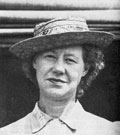 |
Frances Keller
(1901-1979, Inducted 2006)
Frances Keller was one of C. B.
“Cowboy Charlie” Irwin’s three famous equestrian daughters.
Irwin, who ran a Wild West show part of the year, was a Thoroughbred trainer
during the other months. Among his “protégés” was
“Silent Tom Smith,” trainer of Seabiscuit and other champions. Irwin,
a friend and fishing buddy of Will Rogers, was the nation’s leading
trainer in wins in both 1923 (147, $104,054) and 1930 (92, $70,411). After
Irwin’s death in a car accident in 1934, Smith took over training the
Irwin stable. When he left to go work for C. S. Howard, Smith advised,
“Frances, you take the horses. You can train them as well as
anybody.”
In an 1946 article in The
Blood-Horse, “. . . the girl who had been a university student,
paymaster for a Wild West show, and equestrienne (she once rode a horse into
the Waldorf-Astoria [Hotel in New York City]) became a trainer of
Thoroughbreds.”
For a time married to Manny
Keller, track superintendent at both Longacres and Playfair, Frances was the
trainer of record for two Longacres Mile winners, and though two other women
have trained a Mile winner, no other woman has trained two winners of
Washington’s most prestigious race event.
Frances Keller became first female trainer to run a
horse in the Mile when, in 1940, she sent out the favored entry of Pala Squaw
and Olimpo for Al Rosenberg. Three-year-old Pala Squaw won the race by 1 1/2
lengths. Her stablemate dead-heated for third. Six years later, Keller saddled
K & L Stables’ Amble In for his first Mile victory (his second came in
1948 with fellow Hall of Famer Allen Drumheller). Betting choice in the 11th
Mile was Irish champion two-year-old *Mafosta, but with Noel Richardson in the
saddle, three-year-old Amble In took the stakes by six lengths. The final time
of 1:35 set a new track record. During both seasons in which she won the Mile,
Keller was also the leading trainer at the meet.
One of the first women trainers in the nation to
earn a training title at a major racetrack, Keller was also the first woman to
condition a winner of the Washington (Gottstein) Futurity, 1947 winner Happy
Valley. Among the other top horses she trained were 1942 Independence Day
Handicap winner Campus Fusser and 1944 Spokane Handicap winner Prince
Ernest.
Click here for expanded profile. |
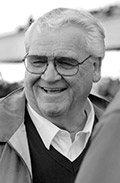 |
Bud Klokstad
(1931- ,
Inducted 2005)
Born and reared on the plains of North
Dakota, Bud Klokstad began his training career in 1955. During the last 50
years he has trained many of the finest Thoroughbreds to race in the Pacific
northwest. Those runners include 1983 Eclipse Award winner Chinook Pass,
Washington horse of the year recipients Staff Rider, who set a single season
earnings record of $280,549 at Longacres in 1992, and Peterhof’s Patea,
who is also the richest Washington-bred distaff runner of all time. He has
trained numerous other state-bred champions: Jumron Won, Bub, Laurel Avenue,
Return Call, Al Renee, Ladies Excuse Me, T.D. Passer and Holy Rascal; and a
host of other top runners. Klokstad, 74, established several standards at
Longacres, such as 14 stakes wins (seven separate stakes winners) and total
purses earned ($851,343) in a single season. He also is the second leading
trainer of all time at the Renton oval with 54 career stakes wins. The affable
Klokstad has posted equally impressive numbers at Emerald Downs, having saddled
the most stakes winners and most stakes wins overall. He has also posted top
figures for earnings in a season ($678,739 in 2002) and total earnings (over $4
million) at the Auburn track. Klokstad also led the trainer rankings in
earnings in 1997 and 2001. He has won a record seven Gottstein Futurities and
saddled the winners for the Emerald Downs Breeders’ Cup Derby three times,
including back-to-back victories in 2001 and 2002. The latter win was with
Flying Notes, who scored by over 11 lengths while racing within one-fifth
second of the world record for nine furlongs, and was later named horse of the
meet.
Click here for expanded profile. |
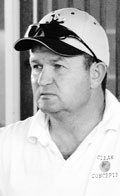 |
Tim McCanna
(1961- , Inducted 2011)
Tim McCanna was born in Spokane on December 20, 1961, into a world of outstanding horsemen. His father, Dan, and brother, Ray were successful trainers, and another brother, Boone, is a top jockey’s agent.
In 1981, Tim took out his training license at Playfair and won 15 races from 122 starts at the Spokane track. One year later, the now 20-year-old conditioner would earn the first of four consecutive Playfair training titles after his charge Idaho Tribe won the closing day Au Revoir Handicap – in track record time – to give him 41 wins. For the next three seasons he would continue dominate: 1983 (48 wins); 1984 (48); and 1985 (42). He won his first stakes with a Washington-bred in 1984 with Harold Krupke’s – who would soon be his father-in-law – three-year-old Reardan’s Gray in the $5,500 River City Handicap.
Tim’s name would first show up in the Longacres standings in 1983, but his first winner at the Renton oval would come two years later. In 1986, Tim was the second leading trainer at Playfair and also had saddled 11 winners among his 98 Longacres starters. He would have 16 Longacres wins in 1987, the same year his father topped the Playfair trainer’s list with a 55 winners. A year later Tim’s name would be among the top 15 trainers at Longacres, ranked 14th with 21 winners. His upward climb continued in 1989, when at meet end, Tim was ranked seventh at Longacres with 34 wins and he gained the number three spot in 1990.
McCanna would lead the way at the 1994 Emerald-Yakima meet with 47 winners. All told, he would saddle 329 winners at the Central Washington track before it closed its doors for good in 1998.
McCanna’s first of so far ten training titles at Emerald Downs would come in 1997 (52 wins). He would repeat in 2000 (55), 2001 (51), 2002 (53), 2004 (52), 2005 (54), 2007 (50), 2008 (66 – a meet record), 2009 (63) and 2010 (63). He has finished second on three occasions and since the track’s 1996 opening he has never been further back than fifth in the standings. McCanna is Emerald’s all-time leading trainer by both wins (808) and money ($7,495,905), through the end of the 2011 racemeet, and in addition, he is one of only three Emerald trainers to have five wins in one day (July 8, 2010).
Tim’s first Washington champion would be Cocktails Anyone for his longtime client Guy Roberts. He would train the mare for most of her two championship seasons (1997-98). McCanna also conditioned 2001 champion juvenile colt Devil’s Enemy and 2007 juvenile champion No Constraints. But probably the best statebred runner to gain from his skills was three-time Washington champion Queenledo, who won seven stakes and earned $242,824 for Kings and Queens Stable, a partnership of her breeder, Harold Krupke, along with Stu Clifford, Jerry Ferry, McCanna and his brother Ray. No other Washington-bred has been named the top of their division for three consecutive years since the great Smogy Dew over 40 years ago.
Among his over a dozen other Washington-bred stakes winners is 2011 juvenile Youtheprizeandi.
Outside of Queenledo, the probable best of his six Emerald season champions was Poker Brad, who raced for Quadrun Stable LLC, a partnership of McCanna, John Peterson and the father-son team of former Playfair president Jack and Brad Pring. The son of Go for Gin won back-to-back Mt. Rainier Handicaps and finished second in the 2003 Longacres Mile (G3). The latter was one of McCanna’s two runner-up finishes out of five starters in Washington’s marquee race.
Other non-Washington-bred stakes winners hailing from the McCanna barn include Moon Up T.C. (his lone stakes winner at Longacres), Emerald Derby winners Alexandersrun and Saratoga Boot, and Gottstein Futurity winner Positive Prize.
A two-time Martin Durkan Award winner, the amiable McCanna was also given special achievement awards in 2004 and 2008.
Through October 16, 2011, McCanna has started 9,859 horses with a record of 1,712-1,512-1,360 and earnings of $11,652,465.
When not on the road between Auburn and California, Tim, his wife and right hand, Jan, and children, Melissa, Conor and Megan, have a 45-acre boarding, breaking and training center, McCanna Thoroughbreds, in Yakima.
|
Hyatt_1.jpg) |
Robert "Red" Hyatt McDaniel
(1911-1955, Inducted 2007)
Born the son of a dairy farmer in Enumclaw
on September 9, 1911, Robert “Red the Raider” McDaniel began his
career in racing as a jockey, riding his first winner in 1926 at Victoria in
British Columbia. His career as a rider ended in 1929, when he broke his leg in
a racing accident.
He then turned to training and
spent three years at Caliente in Mexico, conditioning a small stable for
Vancouver, BC, Canada, resident George Slater. When Slater sold his stable,
McDaniel tried his hand as a jockey’s agent and then became the yearling
trainer at Rancho San Luis Rey in California.
In
1938, McDaniel returned to race training, and from 1950 through 1954, would
lead the nation’s trainers in number of winners. In 1953, he became the
first conditioner to saddle 200 winners when he ended the year with 211. Coming
in second that year was Willie Molter with a distant 138. Though noted as a
California trainer, McDaniels spent some time conditioning runners at Longacres
early on in his career.
McDaniels was well
respected for his ability to make top stakes horses out of former claimers.
Among his most noted were Santa Anita Handicap runner-up Stitch Again, who won
$97,000 and was a $5,000 claim; Blue Reading, an earner of nearly $200,000 who
had been claimed for $6,500; and $275,000 earner Stranglehold, a $7,500 former
claimer.
Among the other top winners he trained was
1955 Santa Anita Handicap winner *Poona II.
McDaniel, who was a popular and soft-spoken man,
was credited for being one of the first to recognize jockey William
Shoemaker’s ability. The future National Hall of Famer “did most of
his early riding on McDaniel horses.” In 1954, Shoemaker teamed with
McDaniel to each take top honors at the 41-day Del Mar meeting. Shoemaker rode
94 winners, with 42 of them among the 47 winners saddled by McDaniels.
The trainer was once quoted as saying, “If
there is any formula for my success, it has been due to studying the conditions
of races, running my horse where they belong, and riding Willie
Shoemaker.”
McDaniels saddled his final
winner, Aptos, on May 5, 1955, just moments before the 44-year-old trainer took
his life by inexplicably jumping off the San Francisco Bay Bridge. At the time
of his death he had a public stable of 60 horses, reported to be the largest in
the country, and had over 30 other horses turned out for rest.
Click here for expanded profile. |
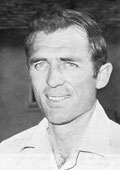 |
Bill McMeans
(1937-2007, Inducted 2010)
Bill McMeans was born in 1937 in Stonewall, Oklahoma. The McMeans family later moved to Grandview with their young family. As a youngster Bill and his dad, J. B. McMeans, competed in calf roping events and Bill would later join the Professional Rodeo Cowboys Association.
Bill and his twin brother Bob – also a highly successful trainer – began their training operation in the 1960s from their Sunnyside-based Emerald Stables.
Bill and his dad also trained Quarter Horses at Yakima Meadows. In future years Bill would be a three-time leading Thoroughbred trainer at the track’s spring meets in 1976 and 1979 and 1988 fall meeting. Bill won 187 races at the Yakima track, including 12 stakes. Eight of those stakes tallies came during the Emerald racing meets at Yakima and include victories with Seaborn in the Eagle Hardware and Garden Derby and with Favored One in the Gottstein Futurity.
Bill was the leading trainer at Longacres in 1970 and 1971. Among his 28 stakes victories, including his other five Gottstein wins, were his victory in the 1974 Longacres Mile with Times Rush and his additional Derby wins with Table Run and Hoist the Silver. McMeans also won the Spokane Handicap four times and the Mary Broderick Memorial Stakes three times.
One of his most talented runners was 1973 Longacres horse of the meet Table Run, whose brilliant nine-length win in the Longacres Derby placed him among the best of his generation.
Bill trained six Washington champions to seven championships. Each of the six was a champion juvenile, with one horse earning back-to-back champion titles.
In 1971 McMeans purchased two yearlings for Dr. John Furukawa, for whom he would later train Table Run. The filly, Cup of Speed, though claimed in her first start, was returned to McMeans’ barn and later won two stakes at Playfair en route to being named champion. The $8,500 sale-topping colt, Koko’s Pal, was from the first crop of Longacres Mile winner Kings Favor. Koko’s Pal would be named 1972 Washington and Longacres horse of the year after winning the Gottstein, El Camino Stakes and WHBA Sales Stakes. He came back to earn his second state championship at three after winning four stakes, including the British Columbia Derby. Also a stakes winner at four and five, Koko’s Pal would eventually win 22 races and earn $182,210. McMeans other champions were 1968 colt Proud Admiral, 1971 colt Prince Joda, 1977 colt Saratoga Dancer and 1994 filly Favored One.
McMeans, who was successful on the Northern California circuit, also trained Maxwell G. before losing him in a claim at Bay Meadows.
Bill passed away on March 6, 2007, at age 69. In addition to leaving his brothers Bob and Wayne, he left four sons, including Bobby, a successful trainer in the McMeans’ tradition. |
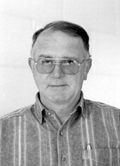 |
Jim Penney
(1934- ,
Inducted 2003)
The other trainer to condition four
Longacres Mile winners is Jim Penney. He accomplished the feat by winning in
1973 (Silver Mallet), 1977 (Theologist), 2000 (Edneator) and again in 2002
(Sabertooth). Penney, who hails from Naches, Washington, took out his
trainer’s license in 1954. He won a record 17 training titles at Yakima
Meadows and is the only trainer in history to win training titles at Yakima,
Longacres and Emerald Downs. He has won virtually every important stakes race
in this state, most of them multiple times. Penney also trained five winners on
a single card at both Longacres and Emerald Downs, a deed that has never been
duplicated. To date, Penney has conditioned over 1,000 winners, which admits
him to a rare fraternity. A third generation Washington horse-man, Penney, 69,
and his wife Betty, operate Homestretch Farm in Edgewood with their family. He
has been responsible for numerous Washington-bred champions, including homebred
Edneator.
Click here for expanded profile. |
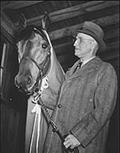 |
Tom Smith
(1878-1957,
Inducted 2003)
A well-known trainer in the 1930’s and
40’s, Tom Smith saddled 29 stakes winners and six champions including the
legendary Seabiscuit. Born in Georgia, his family moved to Colorado when he was
a young boy. Early in his career, Smith trained horses for the U.S. Calvary and
worked on a cattle ranch. In 1934, he began working for automobile magnate
Charles S. Howard. Smith trained at Longacres during the track’s first
four seasons and was the leading trainer there in 1935. After Howard purchased
Seabiscuit for $8,000, the gelding blossomed into a champion handicap horse and
the leading money winner of his day. The Seabiscuit team won stakes from
coast-to-coast and the heart of the American public. Smith later trained *Kayak
II and Oregon-bred Mioland to additional handicap champion titles. He later
went to work for Mrs. Elizabeth Arden’s Maine Chance Farm and led Star
Pilot and Beaugay to colt and filly championships in 1945. In 1947, the stable
won the Kentucky Derby with Jet Pilot. Smith led the national standings in
earnings in 1940 and 1945.
Click here for expanded
profile. |
TinaHine.jpg) |
Kathy Walsh
(1940- ,
Inducted 2009)
Born in 1940 in Sonoma, California, Kathy Walsh spent most of her youth in Northern California. One of five children of Jim and Nonie Walsh, Kathy’s first horse encounters were with the family’s rodeo stock.
Her father switched to training Thoroughbreds because of a long friendship with the Millericks, a prominent California racing family. In the early 1950s Jim was training in Portland and Vancouver, Canada, before expanding his strings to Arizona, New Mexico and California, while the rest of the family managed their 800-acre cattle and dairy farm. Jim first trained at Longacres in 1960 and in the summer of 1963 purchased Don Porter’s Green Valley Farm in Mabton.
Kathy, who was christened Nancy, got his assistant trainer’s license in 1962 after spending many summers at the track with her father, who led the training ranks at Longacres in 1967 and 1969. When her father became seriously ill, Kathy stepped in to manage the barn where she proved to be so conscientious, many of the barn’s owners stayed with her after her father’s death in 1970.
It was not long before the younger Walsh was making her mark. After ranking third to Bill McMeans in 1970 and reaching second behind that trainer in 1971, she earned the first of her three Longacres training titles in 1972. She is one of two women to lead the trainers’ ranks at the Washington track, the other being 2006 Washington Racing Hall of Fame inductee Frances Keller. Among Walsh’s trainees was 1973 Washington champion juvenile filly Patient Madam. She would also finish at the top of the trainer standings at the Renton track in both 1977 and 1978. In her first ten years at Longacres (1970-79), she never ranked lower than fourth on the trainers’ list and was second three additional times. Among her many other top stakes horses of that period were Whoa Boy and Auguste, who were among those she trained for major client Paskey DeDomenico, as well as Brass Knight, Little Joker, Havadasher, Weatherlock, Say Prince, Little Joker, Cascade Katie, Any Time Lady, Tilt the Balance, Nell of the North, Discover Space, Patient Lou, Malert, Usibio and Happy Olympian. In 1979 she was honored with the Steve O’Donnell Memorial Award (later renamed the Lindy Award), for “outstanding leadership, cooperation, sportsmanship and excellence on and off the track.”
After her marriage to Robert Hutchinson, Kathy took a major break from training from 1980-85, although she did condition Ski Racer to take the 1982 Tacoma Handicap for Warlow Stables and Kathy Walsh Stables.
When her marriage dissolved, she returned to training during Canterbury Downs’ inaugural season. It was there she developed 1986 and 1987 Washington champion colt Staff Riot. In 1988 she tied with Bernie Flint as leading trainer at the Minnesota track. During the winter months Walsh would head for Santa Anita.
She did return to Longacres for its final two seasons in 1991 and 1992, winning three stakes in ’91 and eight the following year with Dr. Pain, Ice in Space, Lordy Nelly, Scorned Timber and Senate Appointee.
In 1998, Walsh became only the eighth woman to saddle a horse in the Kentucky Derby (G1) with Irish-bred Hanuman Highway, who finished seventh. There were hopes of a return visit to Kentucky in 2008 with Del Mar Futurity (G1) winner Georgie Boy before the gelding was injured.
Her first Grade 1 win was with Nany’s Sweep in 2001 in the Santa Monica Handicap. Among her other top trainees have been graded stakes winners Evening Promise (GB), her first graded stakes winner in 2000, Islay Mist (GB) and Blazonry. She also trained stakes winners Pelegrin Sands, Boundless Moment and 1987 Canterbury Debutante Stakes winner Turbo Launch, who would later produce stakes winner Turko’s Turn, dam of 2001 Horse of the Year Point Given.
More recently, Walsh ranked ninth in wins (17) at the 2009 winter/spring Santa Anita meeting, was 15th in wins at Holly-wood Park’s spring/summer meet and through October 8, ranks seventh at the Oak Tree meeting at Santa Anita Park which began on September 30.
Click here for expanded profile. |
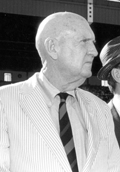 |
Charles Whittingham
(1913-1999, Inducted 2004)
Early in his career, “Charlie”
Whitting- ham spent five seasons at Longacres, beginning in 1935. During this
time, he was a protege of, and trained for, the legendary horseman Horatio
Luro, for whom he conditioned Dandy to a runner-up finish in the 1940 Longacres
Mile. By most accounts, Whittingham would have to be considered one of the
greatest trainers of the last century. His first major stakes winner was
Porterhouse, champion two-year-old of 1953. He went on to train 10 more
champions and an astounding total of 252 stakes winners, as well as six of the
first 50 Thoroughbred millionaires. The list includes 1971 horse of the year
Ack Ack, 1987 horse of the year Ferdinand and 1989 horse of the year Sunday
Silence. The latter two runners were both Kentucky Derby-G1 winners and each
etched Whittingham’s name in the record books as the oldest trainer to win
that historic classic, first in 1986 at age 76 and then again three years
later. Whittingham returned to the Pacific northwest in 1987 and won the
Longacres Mile-G3 with Judge Angelucci. Inducted into the National Racing Hall
of Fame in 1974, Whittingham won Eclipse Awards as the nation’s top
trainer for 1971, 1982 and 1989 and was the leading money-winning trainer from
1970-73, 1975 and again in 1981-82. At the time of his death in 1999, he was
the all time leader by number of wins at both Santa Anita and Hollywood Park.
Click here for expanded profile. |
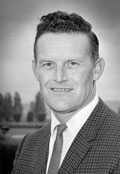 |
Glen Williams
(1927-1992, Inducted 2008)
Renton native Glen Williams first attended
the races at Longacres with his father as boy, soon after the track opened in
1933. After his graduation from the University of Washington with a degree in
engineering, he worked for The Boeing Company, but he soon gravitated to the
track.
He began training Thoroughbreds in 1954, and
in the 20 years that followed, he oversaw, besides Ranniger, Irwin and
Venema’s trio of champion fillies – Smogy Dew, Miss Redoubt and Gold
Afloat – the conditioning of state champions Sparrow Castle, Quina Reigh,
Summereigh, Silver Duke, Better Dancer, Tenino Ville and finally Red Wind in
1972.
At the time of his retirement from training
in 1974, he had trained a record 57 stakes winners during those two decades.
Both Sparrow Castle (1961) and Red Wind (1972) won the Longacres Mile while
under his tutelage. In addition to Longacres Derby winner Smogy Dew –
whose victory over Canadian champion George Royal Williams considered the
highlight of his illustrious career – he also trained 1959 Longacres Derby
winner Auther B and 1960 Derby winner Sparrow Castle.
The Longacres Derby was just one of a trio of
stakes won by Sparrow Castle in 1960. The following year the two-time
Washington horse of the year would add a year-end state-record six stakes
victories to give him a total of nine.
Smogy
Dew’s victory in the 1964 Derby, one of her eight stakes wins, was the
last time a filly has won the top race for sophomore runners.
Williams also trained the winners of six Washington
Stallion Stakes, four Seafair Queen Stakes winners and won back-to-back Spokane
Handicaps. Surprisingly, Williams never topped the Longacres trainer standings
by number of winners.
Among the other stakes
winners housed under his shedrow were: Stirti, Wood Wind, Hi Yu Honey, Stoney
River, Tool Kit, Princess Quilla, North End, Fitness, Me-Jo and *Titular II.
He retired from training to become the director of
racing at Longacres in 1975 at the request of the Alhadeff family after the
death of former racing secretary Steve O’Donnell. Williams held that
position through the 1989 racing season.
He died in
1992 at age 65. |
Go to Top |




RPP.jpg)



Hyatt_1.jpg)



TinaHine.jpg)

